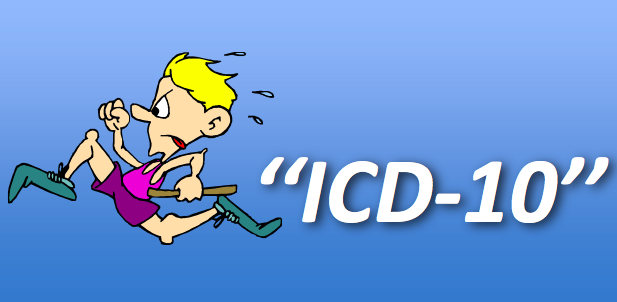The massive ICD-10 change is quickly approaching, and it affects all of us in the healthcare field. Thus, there is no time like the present to start your ICD-10 education. Here are the eight things you need to know now about ICD-10.
1. ICD-10 will replace ICD-9
In a little over a year, you will no longer report the diagnosis codes you know as ICD-9, which are code sets consisting of three to five characters with a decimal point (e.g., 813.15). Instead, you will use International Classification of Diseases, 10th Revision (ICD-10), which uses three to seven characters in an alpha-numeric combination. In addition to a different code structure, there are about five times as many ICD-10 codes as ICD-9 codes. This will ensure an intense level of specificity in coding diagnoses.
2. The change is necessary
The United States is the last country in the world with modern healthcare to adopt ICD-10 diagnosis codes. But playing catch up isn’t the only reason why shifting to ICD-10 is necessary. According to a CMS ICD-10 introduction, the U.S. must transition to ICD-10 because: •ICD-9 produces limited data about patients’ medical conditions and hospital inpatient procedures.
•ICD-9 is 30 years old, has outdated terms and is inconsistent with current medical practice.
•The structure of ICD-9 limits the number of new codes that can be created, and many ICD-9 categories are full.
3. The change is mandatory
According to a CMS ICD-10 FAQ document, “Claims for all healthcare services and hospital inpatient procedures performed on or after Oct. 1, 2014, must use ICD-10 diagnosis and inpatient procedure codes. … Claims that do not use ICD-10 diagnosis and inpatient procedure codes cannot be processed.”
Translation: You won’t get paid for any claims of services after Oct. 1, 2014, if you use ICD-9 codes. Alternatively, payers will not accept ICD-10 codes for payment before the implementation date. Thus, “claims for services provided before Oct. 1, 2014, must use ICD-9 diagnosis and inpatient procedure codes,” says the FAQ.
4. The start date is Oct. 1, 2014
ICD-10 goes into effect on Oct. 1, 2014. That means — to emphasize the point made in number three — you will use ICD-9 diagnosis codes for all claims of service until Sept. 30, 2014. The next day, you’ll use ICD-10 — and there will be no extension. Oct. 1, 2014, is implementation day — period.
5. ICD-10 will not replace CPT codes
ICD-10 codes are diagnosis codes. CPT codes are billing codes. Both go on your claim. Per the CMS ICD-10 FAQ document, “The transition to ICD-10 does not affect CPT coding for outpatient procedures. … Like ICD-9 procedure codes, ICD-10-PCS codes are for hospital inpatient procedures only.”
6. ICD-10 does affect you
I know I’m quoting CMS a lot here, but ICD-10 affects everyone covered by HIPAA — not just those who submit Medicare or Medicaid claims. Thus, ICD-10 affects all rehab therapists as well as all other providers, payers, clearinghouses and billing services. In short, if you deal with HIPAA, buckle up because you’re switching to ICD-10.
7. You need to start preparing
The idea of readying yourself for this change can seem more than overwhelming. Hello, 68,000 diagnosis codes! But the earlier you start, the more time you’ll have to get all your ducks in a row. Here are some pointers: •Develop an implementation strategy. Make sure you assess the impact on your organization, develop a detailed timeline and plan a budget.
•Check with your billing service, your clearinghouse and all of your vendors about their implementation and compliance plans. If you handle billing internally, make sure your coding, clinical, IT and finance staff are involved in the planning of and preparation for your practice’s transition.
For more preparation advice, check out No. 11 in this CMS ICD-10 FAQ document and review this detailed planning and preparation checklist from the American Health Information Management Association.
8. There are lots of resources to help Bookmark the APTA and CMS websites. As we approach the implementation date, these sites will share a wealth of information. If you search ICD-10, you’ll get tons of results. I recommend checking out the following: •The ICD-10 Transition: An Introduction
•FAQs: ICD-10 Transition Basics
• Medscape Modules Available on ICD-10
•ICD-10-CM/PCS the next generation of coding
• Mandated report: Improving Medicare’s payment system for outpatient therapy services
•Tell me again: Why do we need ICD-10?
• ICD-10 Planning and Preparation Checklist
Charlotte Bohnett is a writer, content manager and social media expert for WebPT, a cloud-based electronic medical record (EMR) solution designed specifically for the rehab community. She graduated summa cum laude from Bowling Green State University with a Bachelor of Fine Arts in Creative Writing. Charlotte earned her Master of Science in Technical and Professional Communication from Lawrence Technological University in Southfield, Mich.


